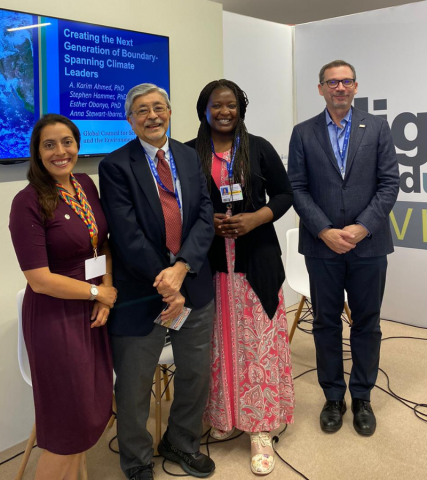Creating the Next Generation of Boundary-Spanning Climate Leaders
Crystal Chissell, GCSE Executive Director
During the second week of COP28, GCSE hosted “Creating the Next Generation of Boundary-Spanning Climate Leaders,” a panel discussion moderated by Anna Stewart-Ibarra, Executive Director of the Inter-American Institute for Global Change Research. The panel focused on the need for science to address the challenges people face in communities changed by the climate crisis.

Early in her career, Esther Obonyo, Ph.D., found a disparity between what she learned about building construction in her courses at the University of Nairobi and the conditions she encountered in Kenyan communities where she found energy poverty, lack of food security, and open sewers. This ignited her interest in developing methodology for transdisciplinary research involving both academic and non-academic partners. At Penn State University, she currently works to incorporate internationalization into education of students in the US, where they can solve problems within the context of the environmental problems faced by people in less developed countries.
Stephen Hammer, Ph.D., is CEO of the New York Climate Exchange, a newly launched consortium of higher education, government and more than 30 New York community groups that aims to be a model for working together across their different perspectives. A large part of the Exchange’s work will be climate literacy for middle and high school students, which Dr. Hammer said would be an opportunity to help the next generation make climate-informed education, career and consumer decisions.
Karim Ahmed, Ph.D., said that people in the global south, and particularly in his native Pakistan, are desperately in need of more expertise around adaptation and community resilience as they are already dealing with flooding and excessive heat.
The New York Climate Exchange also hopes to change perceptions that the only the only climate jobs available involve solar panels, Dr. Hammer said. The excessive heat cited by Dr. Ahmed means that every sector will need to adjust. As one example, medical researchers and medical professionals may encounter new disease vectors. In alignment with his decade spent as a climate policy expert at the World Bank, Dr. Hammer also hopes to see the Exchange educate those in the advocacy community on how to access multi-national finance.
Collectively, these initiatives represent a concerted effort to address multifaceted climate challenges through transdisciplinary collaboration and education.
CLICK HERE TO LEARN MORE ABOUT GCSE'S WORK AND OTHER EVENTS AT COP28